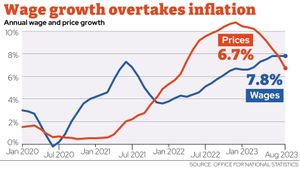The Indian government is gearing up to introduce the 'One Nation, One Election' (ONOE) bill, stirring significant political discussions across party lines. The much-anticipated Constitution (One Hundred and Twenty-Ninth Amendment) Bill is expected to be put forward in the Lok Sabha this Tuesday, with the Union Law Minister Arjun Ram Meghwal at the forefront of this legislative initiative.
Sources indicate plans to form a Joint Parliamentary Committee (JPC) to facilitate broader consultations on this bill, marking it as part of the government's strategy to synchronize national and state elections. This proposed structure aims to bring varied stakeholders, including representatives from state assemblies, to the negotiating table, especially since the bill suggests curtailing the terms of state and union territory assemblies.
According to BJP MPs, who have expressed firm backing for the bill, this legislative push reflects their commitment to improving governance efficiency and economic resource management. Rajya Sabha MP Brij Lal remarked, "We welcome this bill. Until 1966, simultaneous Lok Sabha and state assembly elections occurred, which were more efficient. Now, elections stretch for the entire year, pulling our forces from their duties at the borders. This bill will save time and resources, thereby accelerating development." His sentiments echo across party lines, as other BJP officials rally behind the bill, emphasizing its necessity for development and unified governance.
Rekha Sharma, also of the BJP, detailed how the bill will lead to significant cost savings, stating, "This is a very important bill, and it will save money, resources, and time. The savings will be utilized for development and infrastructure projects. I look forward to it... quality development should not wait long." This perspective underlines the belief among governing party members about the bureaucracy’s current inefficiency, increasingly viewed as a barrier to national progress.
MP Sudhakar K articulated the importance of the ONOE initiative by emphasizing its future benefits. "One Nation, One Election is the ultimate wish of this government... We waste at least one and a half years during election processes of various states," he stated, driving home the idea of continuity and progression without political interruptions. He urged bipartisan support, pointing out this initiative's collective benefits for national governance.
Yet, this proposal is not free from contention. The opposition, particularly members from the INDIA bloc, are expressing their skepticism and critique. While the BJP-led NDA coalition advocates for integration and simplification of elections, the opposition raises concerns about the potential dilution of state interests and free electoral expression. Their arguments are centered on fears of centralized power, potentially limiting regional representation and impacting how local issues are addressed within the ambit of national governance.
Political analysts weighing the discussion also reflect on history, noting the previous harmony where elections occurred simultaneously until 1966. This framework allowed for lower costs and provided security forces with more substantial focus on law enforcement and border control, something BJP members emphasized as increasingly necessary today.
With the bill gaining traction within the Lok Sabha's agenda, its introduction was cleared by the Union Cabinet back on December 12, having been hailed by Prime Minister Narendra Modi as a progressive move for democracy. The high-level panel report behind the proposal, chaired by former President Kovind, lent significant weight to the discussion, setting the foundation for proposed reforms.
Advocates argue it's time to modernize India's electoral structure. Still, the opposition's persistent outcries remind all parties involved of the inherent risks within such significant reforms. Balancing efficiency with representational integrity poses the central challenge as political factions vie for influence and address concerns about regional autonomy.
While the ONOE bill's potential advantages, such as streamlined efforts and enhanced resource management, are repeatedly stressed, the dialogue surrounding its repercussions continues to evolve. The continuing discussions and planned consultations through the JPC will be pivotal as the bill moves through the legislative process. How this will reshape not only election cycles but also the fabric of Indian democracy remains to be seen.



